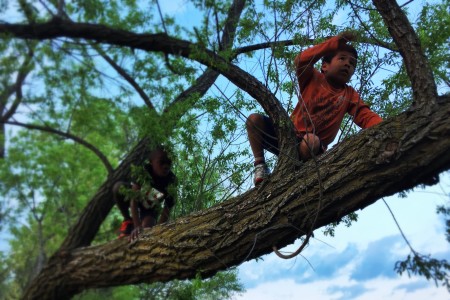A couple months ago I started attending a Refit class. It’s similar to Zumba or Jazzersice and I am awful at it. Truly awful. I go because I know it’s good for my body and I like the camaraderie of a bunch of moms (and sometimes a couple kids) doing dance moves we’d N-E-V-E-R do in public. I like to be exhausted and sweaty and feel like I really worked hard. Because I am a terrible dancer, it’s also a fun challenge for me and I feel like I’m using parts of my brain that don’t otherwise get involved in my daily routine. It’s been a really good thing for me.
A couple weeks ago we heard a song on the radio and I said to my kids, “Hey! That’s one of the songs from my dance class!” My six year-old said, “Are you bad at dancing to that song, Mom?” and I told him, “Oh, I am REALLY bad at dancing to that song! But it’s so much fun.” We went on to talk about how I grew up in a home where people didn’t dance so I never used those muscles or developed those skills. We laughed about the idea of Grandma and Grandpa dancing. We talked about how other cultures use dance to express themselves and how people use dance to worship God.
I guess I could have been offended that he asked me if I was bad at dancing, but the idea that I’m bad at dancing has been a well documented fact for so much of my life that at this point it has ceased to be hurtful. The whole conversation underscored something that’s important to me in my parenting: I want my kids to be okay with being bad at something.
It’s been fascinating to me to read the research out there about how we best encourage kids if we want to enable them to be successful. It is not about praising their innate gifts (“You’re so smart! You’re so athletic!”) it’s about praising their work ethic (“I can see how hard you worked to figure that out!”). Kids who are praised for being innately good take less risks because they don’t want to jeopardize that perception. Kids who are praised for working hard are willing to work harder even if they risk being wrong. They learn to trust their ability to try.
I can see how in my own life I have been limited by only doing what I thought I was already good at. I never participated in sports because I’m not coordinated. I won’t take an art class because I don’t consider myself artistic. I don’t like to bring dishes to potlucks because I think of my cooking as being more functional than it is beautiful.
My pursuit of dance has been a conscious decision to do the things that scare me.
I want to be able to look at my skill set honestly, but not let it keep me from learning. And I want that for my kids, too. If they aren’t coordinated, I don’t want to lie to them and say they are. I do not believe in all this “follow your dreams” nonsense or the “you can be whatever you want to be” idea. I also don’t want them to think that just because they aren’t gifted in a certain area, they can’t do things they enjoy. If they’re tone-deaf, that isn’t the end of the world. Violin may not be an ideal instrument for them, but even tone-deaf kids can play the piano or drums and I think everybody should experience music in some way. I don’t want their limitations to keep them from certain activities because sometimes we enjoy things we aren’t actually very good at.
I don’t want my kids to be so afraid of failure that they don’t try. I don’t want to be so afraid of their failure that I don’t LET them try. I don’t want them to have an idea that you have to be perfect at something in order to enjoy it or that you have to be defensive or embarrassed if you aren’t talented in a certain area. We all have gifts and we all have weaknesses. We need to recognize them, but not let them limit us when it comes to what we enjoy.
I do think there’s a difference between being honest with ourselves and being unkind with ourselves. I’ve spent too long not knowing the difference. I was so embarrassed in my younger years about my inability in sports (always picked last in PE) and dance (always a wallflower at school dances) that I developed really negative self-talk about it. I made it a defining feature of my life and communicated to myself that not being good at those things meant not being good or talented or smart or likable. As I hear my kids talk about their own gifts, I want to be encouraging them to be realistic and honest without being hurtful in the ways they speak about themselves.
Failure is a good and important part of learning who we are and how to get back up when you fall. As adults, let’s model that for our kids by trying new things and talking honestly about our struggles. Let’s stop hiding our failures and instead, turn them into lessons about the value of trying again and doing things you love even when they’re hard. At least, that’s what I’m going to do the next time I burn dinner, or make a loud mistake when we’re singing at church, or when I trip over my own feet and fall at Refit (this has actually happened). Who’s with me?


Pingback: A Newbie’s Guide to Self-Care: What works for you? | A Musing Maralee